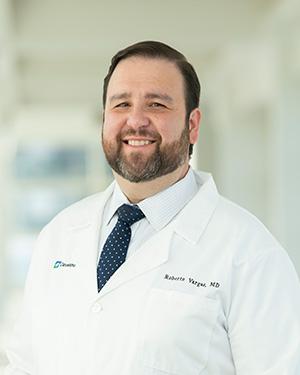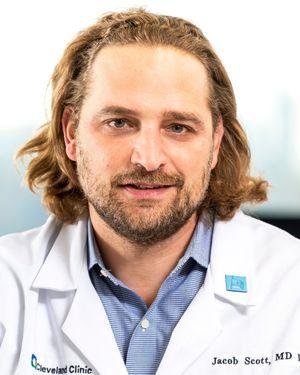Research News
12/13/2024
Studying cancer evolution to improve treatments for endometrial cancer
Understanding how evolution drives resistance to endometrial cancer chemotherapy can help researchers force tumors to evolve vulnerabilities to new treatments.

Physician scientist Roberto Vargas, MD, recently received funding to investigate uterine (endometrial) cancer evolution and determine how the cancer cells adapt to chemotherapy and develop treatment resistance. By adapting existing evolutionary oncology approaches that map out tumors change over time, the project aims to understand the DNA mutations that tumors develop in real time as resistance forms. Dr. Vargas and his team ultimately aim to develop new approaches to treatment for endometrial cancer, when standard therapy fails.
The two-year Department of Defense grant addresses the skyrocketing incidence rate for endometrial cancer, one of the few cancers with a growing number of new cases in the United States. Coupled with the staggering 20% increase in the number of new cases over the last five years, mortalities also continue to increase. Endometrial cancer remains the only cancer (out of all cancers) without a significant improvement in this mortality figure over the last 3 decades.
Dr. Vargas’s background as a gynecologic oncologist who in both the surgical and treatment management for women with endometrial cancers fuels his passion to do better through research. His primary collaborator and co-investigator, Jacob Scott, MD, DPhil, leads the evolutionary oncology program within the Department of Translational Hematology and Oncology Research (THOR) at Cleveland Clinic and is integral to this research effort.
“Unlike virtually all other cancers, we’ve been stuck with the same endometrial cancer treatment paradigms we had decades ago. These paradigms don’t provide many good options once a patient fails to respond to first line therapy,” Dr. Vargas says. “We need to stop reacting to cancer after it develops resistance; we now have the tools and computing power to be proactive in preparing better options before resistance develops. Now is the time to start asking the question, can we stay a step ahead of cancer?”
Exploiting cancer evolution for endometrial cancer treatment
When a tumor develops chemotherapy resistance to one drug, it can also develop a new vulnerability to another. Dr. Vargas says this phenomenon, called collateral sensitivity, can provide new options for treatment.
“Clinically, we know that tumors can become resistant to multiple drugs while only being treated with one agent,” he says. “The same process that pushes the tumor to adapt and change also allows for the possibility of the inverse: new vulnerabilities that weren’t there before”.
Dr. Vargas was able to model the concept of collateral sensitivity in endometrial cancer in the lab, demonstrating that this phenomenon does occur in endometrial cancers and supporting the idea that endometrial cancer therapies which were deemed ineffective at first, could later be useful after resistance develops.
“Conceptually, we could already be in possession of the right drugs, but we could have just tested (or used) them at the wrong time,” he says. “To our knowledge, this is first time we have demonstrated this phenomenon in endometrial cancer”
Dr. Vargas and his team will further develop these laboratory models of endometrial cancer evolution in the lab and test whether existing drugs could be harnessed for therapeutic benefit by just changing the order or time in which they are used.
While these concepts are novel when it comes to treating cancer, Dr. Vargas says collateral sensitivity is successfully used to treat antibiotic-resistant infections. Some clinicians exploit collateral sensitivity to “trick” antibiotic-resistant bacteria through multiple rounds of treatment, delivering medications that will cause the bacteria to evolve and develop new vulnerabilities.
Predicting cancer evolution to harness collateral sensitivity
Dr. Scott, a radiation oncologist and physician-scientist, is leading expert in cancer evolutionary game theory who has published many strategies to predict and test collateral sensitivity. Alongside Dr. Vargas, the team will combine computational analyses, mathematical modelling and preclinical experiments to predict and validate the best ways to manipulate the evolutionary process and harness collateral sensitivity for clinical use.
They believe that understanding how both treatment resistance and collateral sensitivity arise in a tumor over the course of treatment is the first step in developing proactive therapeutic strategies.
“Instead of letting the cancer run the show by developing resistance to necessary treatments, we want to take back control and be one step ahead. Let's understand where the tumor prefers to go and already be waiting there with best available treatment in hand” Dr. Vargas says.
Featured Experts
News Category
Related News
Research areas
Want To Support Ground-Breaking Research at Cleveland Clinic?
Discover how you can help Cleveland Clinic save lives and continue to lead the transformation of healthcare.
Give to Cleveland Clinic
